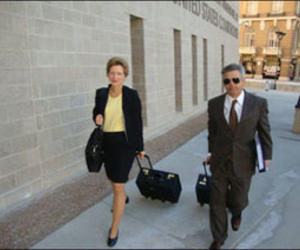Key moment as journalist takes stand in Posada trial
- Submitted by: manso
- Editorial Articles
- 03 / 19 / 2011

A New York Times contract employee who interviewed Luis Posada Carriles in 1998 testified Wednesday that Posada told her that small explosives were used in a series of tourists bombings but only to scare away tourists.
By Juan Tamayo. EL PASO, Texas -- ElNuevoHerald.com. The most critical part of the Luis Posada Carriles trial began Wednesday with a New York Times writer testifying that he granted her a 13-hour interview to highlight “the heroic nature’’ of his anti-Castro militancy.
Posada “didn’t feel he was getting his side of the story out,’’ said Ann Louise Bardach, who reported that during the 1998 interview he acknowledged his responsibility for a string of bombings of Cuban tourist spots in 1997 that killed one Italian man.
Posada added that he wanted recognition for “the heroic nature of what he was doing in his campaign’’ of bombings in Cuba, Bardach added.
Tapes of the interview played for the jury showed Posada saying of the bombings: “We try to ... We put small explosives’’ not to kill anyone but to scare off tourists and cut off the government’s income from foreign visitors.
Bardach also testified, however, that at the end of their interview Posada gave her three pages of handwritten notes that included the sentence, “he does not admit the bombs in Havana. but he does not deny either.”
The note showed Posada “had some concerns’’ about what he had told her during the 13 hours of interview over three days and was trying some “Monday morning quarterbacking,” she added.
Bardach is the key witness to the main charges against Posada — lying under oath to U.S. immigration officials when he denied any responsibility for the Cuba bombings. He’s also accused of lying about how he was smuggled into the United States in 2005 and about a fraudulent Guatemalan passport.
She interviewed Posada after she was contracted by the New York Times to write a series of stories on violent exile attacks on Cuba with co-author Larry Rohter.
They let it be known that they wanted to interview Posada, and he eventually telephoned her and agreed to meet in the Caribbean island of Aruba, Bardach testified.
“He didn’t feel he was getting out his side. He was ticked off about some article that ran in The Miami Herald,” she said, adding that he had confirmed to her some parts of The Herald reports but denied others.
She recorded Posada saying that the story — a 1997 report linking him to a string of bombings against Honduran President Carlos Roberto Reina — was false.
He confirmed a Herald report that he plotted to assassinate Fidel Castro during a visit to Colombia and blow up two Cuban ships, but not in Honduras as the Herald reported.
Bardach fought but lost a lengthy legal battle against a prosecution subpoena to turn over her tapes of the interview and appear in court as a prosecution witness.
“I am not a witness for or against anyone,’’ she declared in court. Prosecutor T.J. Reardon quickly shot back, “That may be true in your mind. But legally that’s not true.’’
Bardach testified that most of the interview was done in English because Posada said he understood the language and she and Rohter did not want to open the door to later claims of mistakes in the Spanish-to-English translations. Posada has variously claimed that he had problems understanding her English, that he lied to her at times and that she secretly recorded the interview without his consent.
She testified the tape recorder was large, that she usually placed it in full view and close to Posada so it could record his voice and that he turned off the recorder himself several times when he did not want his comments recorded — though the entire interview was on the record.
The usually tedious trial also saw a bit of drama Wednesday as Bardach reported that she had been ill for some days and received a large cup of green tea. She often closed her eyes as Reardon prepared his next question, and at one point he asked her if she had fallen sleep. Bardach said no.
Defense attorney Arturo Hernandez objected strenuously when Bardach, in the presence of the jury, mentioned that Posada was a fugitive at the time of the interview and that there were “security concerns’’ about the interview with him.
The seven women and five male jurors have not been allowed to hear evidence about much of Posada’s background, including his escape from a Venezuelan jail in 1985 while awaiting trial for the 1976 bombing of a Cuban airliner that killed all 73 persons aboard.
Source: /www.miamiherald.com/2011/03/16/2118104/
Comments